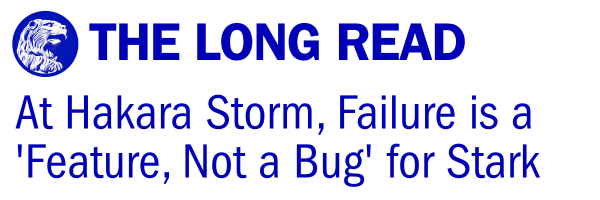The lesson from Haraka Storm: Europe’s defence startups must be allowed to stumble if they’re ever to stand ready
Issue 47: While our adversaries test weapons in live combat, we debate optics. Plus, guest posts from Will Stone, UK MP and Samuel Burrell, Partner, Expeditions; as well as startup news
Good afternoon from the team at Resilience Media
It has been a busy week with a lot of opinions about the British Army Haraka Storm exercise in Kenya, where Helsing and Stark were in situ to demonstrate, test, and train military end users on their loitering munitions capabilities. Following a breathless piece on the performance of the Stark Virtus drone, what transpired has been a discussion about money, investors, and highly capitalised startups.
It should be a discussion about the urgency of war.
It is our position at Resilience Media that NATO needs Stark, Helsing, and other newcomers to the industry to succeed because we face an imminent threat from Russia. If there is an attack against NATO’s Eastern Flank, as the drone incursion in Poland showed, we are completely unable to cope. If Russia fired thousands or even hundreds of small cheap drones into a European country we’d be unable to counter it at all given our level of preparedness. Our news analysis is excerpted below in The Long Read section.
We were proud to bring two excellent guest posts on following the Haraka Storm news, one from Will Stone, UK Member of Parliament for Swindon North, Labour Business Champion for Defence and another from Samuel Burrell, Partner at Expeditions. You can find both below in our Guest Post sections.
Elsewhere on Resilience Media:
STV and Post-Quantum Join Forces On Quantum-safe Defence Communications
Europe Can’t Just Hoard Nvidia Chips, Founders Warn – it Must Build its Own AI Backbone
Anduril Begins Flight Testing Of the Semi-Autonomous YFQ-44A Combat Aircraft
November is shaping up to be a busy month which will see the team in Paris and Helsinki, not to mention the London for the UK-UA Defence Tech Forum. If you’re going to be in town, let us know.
Until next week.
-Leslie Hitchcock, co-founder and Publisher, Resilience Media
We spoke to over a dozen people familiar with the British Army training exercise in Kenya, following a news piece singling out Stark’s Virtus drone perceived lacklustre performance.
It’s a story making the rounds with all the right buzzwords. Drones. Startup. Peter Thiel. Crashed. Specifically, one of the hottest defence tech startups in Europe flamed out during an important military exercise using its tech. Militaries are rebuilding, and they want to tap into the latest defence tech to stay ahead of their adversaries, but being at the leading edge sometimes becomes being at the bleeding edge.
But what really happened at Haraka Storm? Read our analysis here.
I was recently asked to comment on the reported limitations of the Stark Virtus drone during a exercise in Kenya.
My first point is critical, and drawn from my time in the military and from training professional athletes in combat sports: “It’s significantly better to fail in training, instead of failing in the theatre of war where the stakes are significantly higher.”
Training is where boundaries are pushed. It’s where we explore, test, learn, and adapt. I’ve been on exercises where entire companies were wiped out due to poor tactics. My immediate thoughts were always: “How did that happen? How do we make sure it never happens again? And thank goodness this wasn’t real combat.” Read on here.
Follow Resilience Media on LinkedIn and Bluesky to catch our latest news coverage in your feed. And don’t be shy; bring your voice to the discussion.
As someone who has tested new military technology, both on the front line and in more benign training environments, I know that it doesn’t always work the first time. Or sometimes it works, but not in the way you expected it to. Or wanted it to.
I’ll come back to that idea in a moment.
Over the weekend I read an interesting piece by Chris Miller – A Competitive Assessment of US Software — from 1984. He points out that the top software companies from that year are almost unrecognisable to the modern reader.
That’s because the industry’s explosive revenue growth was being driven by a major business model shift. The leading software players of 1984 were losing ground to new upstarts. Read more here.
UK-UA Defence Tech Forum
Resilience Media is once more a Media Partner of the 4th UK-UA Defence Tech Forum, which is taking place on 18th November at RUSI in London with the official support of the Embassy of Ukraine in the UK.
The series of conferences was convened to enhance the collaboration between Ukrainian, British and international defence tech firms, together with the VC community, to scale up production and speed up R&D and new innovations. To date the series has attracted over 750 participants and registration has had to be closed well in advance of each event. Highlights include a pitch session featuring 15 hand-picked leading Ukrainian defence tech companies designed to create partnerships with international counterparts and to meet with leading VCs.
Resilience Media readers receive a 25% discount on the registration fee. When registering on the Forum webpage simply enter the code Resilience25. For any questions contact the organisers at: stephen.butler@strategy-council.com.







